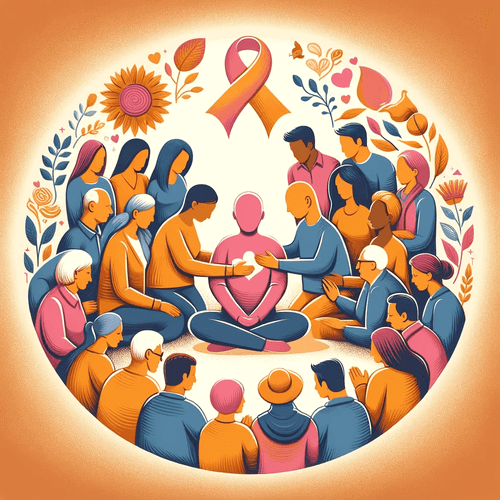Explore the profound impact of a cancer diagnosis on relationships in this insightful blog. It delves into the complexities faced by both patients and their loved ones, from shifting roles to communication hurdles and emotional strains. The article also addresses the hurtful phenomenon of ghosting, highlighting its deep emotional toll on patients. It offers practical advice on overcoming common reasons for ghosting and emphasizes the importance of effective communication and consistent support. The blog also guides readers on managing their own emotions when supporting a loved one with cancer, underscoring the power of small gestures in showing care. Additionally, it provides thoughtful strategies for reconnecting after unintentional ghosting and fostering a supportive community, reinforcing the crucial role of maintaining connections during these challenging times.
Understanding the Impact of Cancer Diagnosis on Relationships
A cancer diagnosis doesn’t just affect the patient; it reverberates through their entire network of relationships, altering dynamics in ways both subtle and profound. Here’s how relationships are often impacted:
- Shift in Roles: Friends and family may find themselves in caregiver roles, which can change the dynamics of the relationship. The patient, accustomed to independence, might struggle with this new dependency.
- Communication Challenges: Uncertainty about what to say or how to act can lead to communication breakdowns. Both parties might feel awkward or unsure, leading to decreased interaction.
- Emotional Strain: The emotional toll of cancer can lead to mood swings and changes in personality, which can be challenging for both the patient and their loved ones to navigate.
- Social Withdrawal: Patients might withdraw socially due to physical symptoms or emotional distress, impacting their social circles.
- Altered Plans and Expectations: Long-term plans, daily routines, and lifestyle choices might have to be reconsidered, affecting relationships on various levels.
The Emotional Toll of Ghosting on Cancer Patients
Ghosting – the act of suddenly cutting off all communication without explanation – can have a profound emotional impact on cancer patients:
- Feeling of Isolation: Cancer patients often already feel isolated due to their illness. Ghosting can exacerbate these feelings, making them feel abandoned in their time of need.
- Loss of Self-Esteem: Being ghosted can lead to self-doubt and significantly impact the patient’s self-esteem. They might start to blame themselves or their illness for the loss of the relationship.
- Heightened Anxiety and Stress: The sudden loss of a support system can increase anxiety and stress, which can be detrimental to both mental and physical health, potentially impacting their recovery and response to treatment.
- Trust Issues: Ghosting can lead to trust issues, making it harder for the patient to open up to others in the future, thereby affecting their ability to form supportive relationships.
- Compounding Grief: On top of dealing with a life-altering diagnosis, ghosting adds an additional layer of grief as they mourn the loss of the relationship.
- Impact on Recovery: Emotional well-being is closely tied to physical health. The added stress and emotional pain of being ghosted can negatively affect the patient’s recovery process.
Common Reasons for Ghosting and How to Overcome Them
Ghosting someone with cancer, often unintentional, can stem from various personal challenges. Understanding these reasons can help in finding ways to overcome them.
- Fear of Saying the Wrong Thing: Many fear saying something that could hurt or offend. Overcoming: Learn about compassionate communication. It’s okay to admit, “I’m not sure what to say, but I want you to know I care.”
- Feeling Helpless: Feeling unable to provide the support or answers a cancer patient needs can lead to avoidance. Overcoming: Accept that it’s okay not to have all the answers. Offering a listening ear can be more valuable than offering solutions.
- Personal Discomfort with Illness: Some may find it hard to face the reality of a loved one’s illness due to their discomfort. Overcoming: Seek support for yourself, such as counseling, to process your feelings and build resilience.
- Busy Life: People often get caught up in their lives and unintentionally lose contact. Overcoming: Schedule regular check-ins, even if it’s just a brief message or call.
- Misconceptions About Needs: Some might believe that the person wants space or doesn’t need their support. Overcoming: Directly ask the person what they need or prefer regarding communication and support.
Effective Ways to Communicate Your Support and Concerns
Effective communication is key in showing your support in a way that is helpful and meaningful:
- Be Genuine: Express your concern and support in a way that feels natural to you. Authenticity is comforting.
- Use Open-Ended Questions: Encourage them to share their feelings and needs by asking open-ended questions like, “How can I support you right now?”
- Active Listening: Focus on listening rather than just hearing. Validate their feelings by acknowledging what they say without rushing to fix the problem.
- Offer Specific Help: Instead of saying “Let me know if you need anything,” offer specific forms of help like, “Can I bring dinner on Wednesday?” or “Do you need a ride to your next appointment?”
- Stay Positive but Realistic: Maintain a positive outlook without dismissing the gravity of their situation. Avoid clichés and platitudes that might minimize their experience.
- Respect Their Wishes: If they ask for space or specific types of support, honor their requests. Respect their boundaries and privacy.
- Consistent Check-ins: Regularly checking in shows that your support is ongoing. Even if they don’t always respond, knowing you’re there can be a great comfort.
- Encourage Professional Help: If you feel they need more support than you can provide, gently suggest professional help such as counseling or support groups.
Navigating Your Own Emotions: Dealing with Fear and Helplessness
Supporting a friend or loved one with cancer can bring a range of complex emotions, including fear and helplessness. Here’s how to navigate these feelings:
1. Acknowledge Your Feelings: Recognize that it’s normal to feel scared or helpless. These emotions are a natural response to a loved one’s illness.
2. Seek Support: Talk about your feelings with someone you trust. Sharing your worries can alleviate the burden and provide perspective.
3. Stay Informed: Educate yourself about the type of cancer and treatment. Understanding the situation can reduce fear of the unknown.
4. Practice Self-Care: Engage in activities that promote relaxation and well-being. This can include exercise, meditation, or hobbies.
5. Set Realistic Expectations: Accept that there are limits to what you can do. You can’t fix everything, but you can be a source of comfort.
6. Professional Help: Consider counseling or therapy if you’re struggling to cope. A professional can provide strategies to manage your emotions effectively.
The Power of Small Gestures: Simple Ways to Show You Care
Small gestures can have a significant impact on someone dealing with cancer:
1. Send a Thoughtful Message: A simple text or note saying, “Thinking of you,” can brighten their day.
2. Share a Memory: Reminisce about good times you’ve shared. This can be uplifting and a welcome distraction.
3. Bring a Comforting Item: A cozy blanket, a favorite snack, or a book can be comforting.
4. Offer a Listening Ear: Sometimes, just being there to listen can be the most powerful gesture of all.
5. Help with Everyday Tasks: Offer to run errands, do grocery shopping, or handle other chores.
6. Create a Playlist or Watch a Show Together: Sharing music or watching a favorite show together can provide a sense of normalcy and relaxation.
Reconnecting: How to Approach Someone You’ve Unintentionally Ghosted
If you realize you’ve unintentionally ghosted a friend with cancer, it’s important to reconnect in a thoughtful way:
1. Acknowledge the Gap: Start by acknowledging the lapse in communication. Be honest about why it happened without making excuses.
2. Apologize Sincerely: Offer a heartfelt apology. Let them know you regret not being in touch and that you care about them.
3. Express Your Desire to Support: Clearly communicate your wish to be there for them moving forward.
4. Let Them Lead: Give them space to express their feelings about the situation and listen attentively.
5. Make No Assumptions: Don’t assume they want or need the same type of support they did before. Ask how you can be helpful now.
6. Follow Through: Demonstrate your commitment to the relationship through consistent actions and support.
Fostering a Supportive Community: The Role of Friends and Family in Cancer Care
Creating a supportive community plays a crucial role in the journey of a person diagnosed with cancer. Here’s how friends and family can foster such an environment:
1. Form a Support Network: Establish a group of friends, family members, and caregivers who can provide various types of support, such as emotional, practical, or informational.
2. Coordinate Efforts: Use tools like online calendars or apps to organize help with meals, transportation, child care, or housework, ensuring that the person with cancer does not feel overwhelmed.
3. Educate Themselves: Friends and family should educate themselves about the specific type of cancer and its treatments to better understand what the patient is going through.
4. Promote Open Communication: Encourage open and honest communication within the network, allowing the person with cancer to express their needs and preferences.
5. Include the Patient in Social Activities: Keep them included in social gatherings and events to the extent they feel comfortable and able to participate.
6. Respect Privacy and Boundaries: While being supportive, it’s important to respect the individual’s need for privacy and downtime.
7. Emotional Resilience: The community should foster emotional resilience by sharing positive stories, celebrating small victories, and maintaining a hopeful outlook.
Conclusion: The Importance of Maintaining Connections in Difficult Times
The journey through a cancer diagnosis and treatment can be one of the most challenging experiences of a person’s life. Maintaining connections during these times is vital:
1. Strength in Togetherness: Connections provide emotional strength and resilience, reminding the person that they are not alone in their journey.
2. Mutual Support: These connections are not just beneficial for the patient but also for friends and family, as they navigate their roles in the support network.
3. Shared Understanding: Maintaining connections fosters a shared understanding and empathy, creating a more compassionate environment for the patient.
4. Continuity of Care: A strong network ensures continuity of care and support, which can have a positive impact on the patient’s treatment and recovery process.
5. Embracing Hope: In difficult times, the collective hope and positive energy of friends and family can be a powerful force in the patient’s life.
In conclusion, the role of connections in cancer care cannot be overstated. They offer a lifeline of support, understanding, and hope, which can significantly impact the patient’s ability to navigate the challenges of their diagnosis and treatment. For friends and family, being part of this support network is not only a way to help their loved one but also an opportunity to grow in empathy and compassion.



